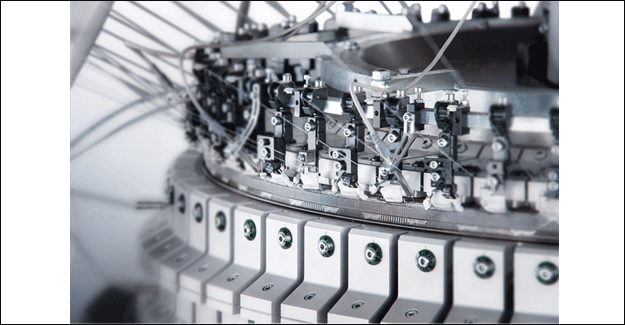
Gebrüder Otto Nominated For ITMA Award With Mayer & Cie.'s spinitsystems
The yarn manufacturer Gebrüder Otto has been named, along with Levi Strauss & Co. and Berto Industria Tessile SRL, as one of the three finalists for the Industry Excellence Award that is to be presented at this year's ITMA in November. Gebrüder Otto used the prototype Mayer & Cie. spinitsystems spin-knit machine to manufacture single jersey knitwear with energy consumption a third less than that used during the conventional spinning and knitting process. As a spinner, Gebrüder Otto also makes the roving slub that spinitsystems processes. Mayer & Cie. is presenting its spin-knit machine at this year's ITMA, where the spinitsystems market launch will get under way.
Development partnership with shared objectives
Gebrüder Otto is a yarn and twisted yarn manufacturer founded in 1901 and based in Dietenheim, Baden-Württemberg. Its customers are in the circular and flat knitting and weaving industries. Otto products are also put to technical use in, for example, the medical, automotive and hygiene sectors. Sustainability is a key issue for Gebrüder Otto and one that is pursued with a great deal of inventive spirit and innovative strength. One of the company's latest developments is a high-quality yarn that includes about 25% of production waste cotton such as spool thread or selvage. Thanks to this recycling, production of this yarn requires significantly less water and pesticide than the conventional manufacture of cotton yarn made solely from new raw material. When, at the beginning of 2013, knitting machine manufacturer Mayer & Cie. was looking for a partner in developing new knitted fabric based on its spin-knit technology, Gebrüder Otto was an obvious contender. "For one, we buy our roving the roving slub that spinitsystems processes - from Gebrüder Otto," says Dr. Wolfgang Bauer, Head of Research & Development at Mayer & Cie. "For another, the benefits we can offer with spinitsystems are very much in keeping with Gebrüder Otto's philosophy. After all, spinitsystems uses a third less energy than the conventional process. In addition, spinitsystems has a lower CO2 emission level, and with spool thread from production fed back into the production process, waste output is also reduced significantly."
Positive experiences with spinitsystems at Gebrüder Otto
Nomination for the Industry Excellence Award could mean the first award for the experience gained by Gebrüder Otto with spinitsystems and the underlying spin-knit technology. The winner will be announced in Milan on 12 November. "We are naturally delighted with the ITMA Industry Excellence Award nomination and would be proud if we were to win it," says Andreas Merkel, Managing Director, Gebrüder Otto, "and regardless whether we do so, we already consider our experience with spinitsystems to be a gain for us." Mayer & Cie. has indeed been able to provide Gebrüder Otto in spinitsystems with a unique selling proposition that is a fine match for Otto's sustainable production requirements. Otto Managing Director Merkel also considers the results that spinitsystems delivers to be convincing and anything but mundane. Because the yarn is not twisted, fabric produced on the spin-knit machine has no skew. He also praises the fabric's soft and voluminous feel. Along with the obvious jersey knitwear that Otto customer and natural fashion manufacturer HessNatur will be the first to use in its collection, Andreas Merkel sees uses for spinitsystems in the technical textiles sector. "What fascinates me most about spinitsystems is, however, the fact that in my opinion Mayer & Cie. has succeeded with it in making a quantum leap," Merkel says. "In textiles machinery it was looking as if we had reached a stage in which it would mainly be a matter of optimising existing solutions. Mayer & Cie. has now come up with a totally new process with an entirely different approach to that of conventional knitting machines. In my view that is a courageous and ground-breaking step."
The benefits of spinitsystems in brief
The reason for the much more favourable energy balance sheet of spinitsystems in the spin-knit process is the combination of processes. spinitsystems performs four steps: ring spinning, cleaning, rewinding and, finally, circular knitting. The most energy-intensive steps - ring spinning and rewinding - are no longer required, and that is why spinitsystems in addition to its sustainability benefits delivers the product in significantly shorter production times. That in turn leads to lower investment in machinery, while the spin-knit process also reduces production costs considerably in comparison with the conventional manufacturing process.
This is how spinitsystems works in brief. The roving slub is removed from conventional roving bobbins and fed to an electronically controlled conventional 3-over-3-drafting system where it is warped into a fine fibre composite that is then, in a conventional circular knitting process, formedstraight into stitches, creating a textile surface. A synthetic auxiliary yarn or core filament is not required, so the raw materials can be processed in their pure form. spinitsystems will be on show for interested trade visitors at the Mayer & Cie. ITMA stand in Milan. The trade fair also marks the spin-knit machine's sales launch.
Textile Excellence
If you wish to Subscribe to Textile Excellence Print Edition, kindly fill in the below form and we shall get back to you with details.












